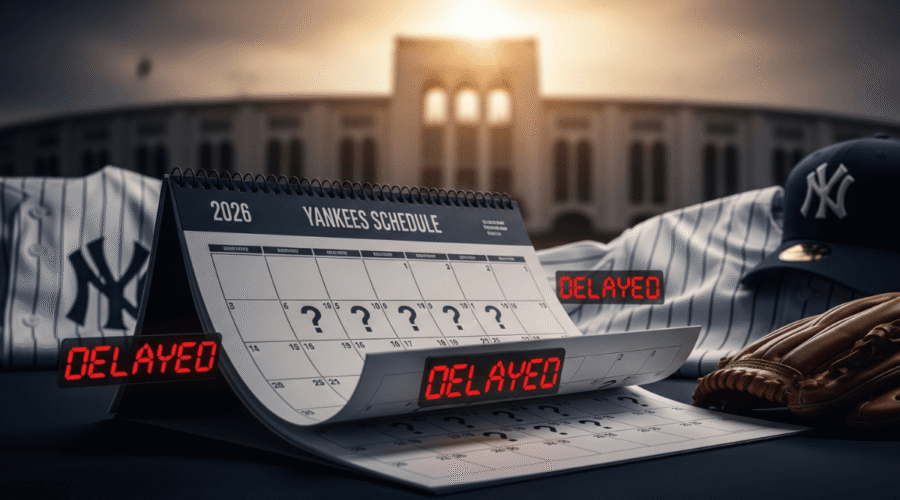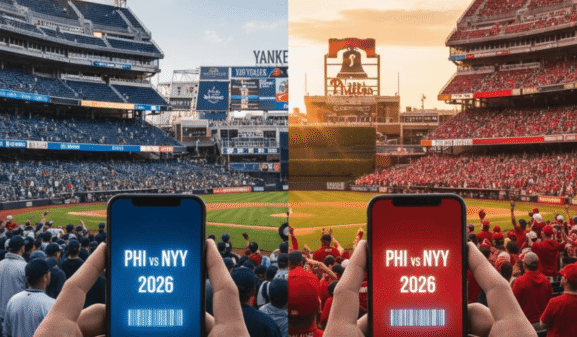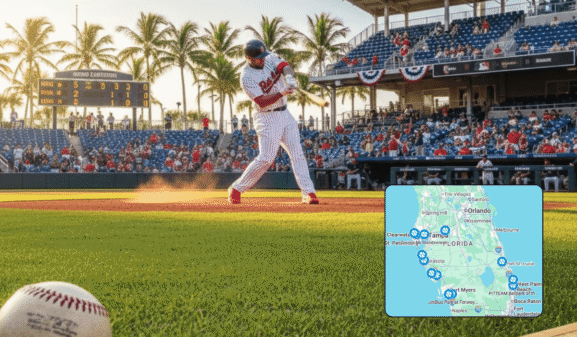Yankees 2026 Schedule Release Date: Predictions and Rumors About the Historic Delay
MLB releases 2026 regular-season schedule
The New York Yankees faithful are experiencing something unprecedented in recent baseball history. As August 2025 draws to a close, predictions and rumors swirl around when MLB will finally announce the 2026 schedule, leaving fans in an unusual state of uncertainty. This delay represents the longest wait for a schedule release in modern baseball memory, with implications stretching far beyond simple calendar planning.
The Current Situation: An Unprecedented Wait
As of August 16, 2025, the 2026 MLB schedule remains unreleased, marking a significant departure from the league’s typical mid-July announcement pattern. This timing places the eventual release at least a month behind historical norms, creating ripple effects throughout the baseball community that extend from front offices to fan living rooms.
The verified historical data reveals MLB’s consistent preference for mid-to-late July releases, making the current delay particularly striking. Recent schedule announcements have followed a predictable pattern:
Past Release Dates
| Year | Date | Day of Week |
| 2025 | July 18th, 2024 | Thursday |
| 2024 | July 13th, 2023 | Thursday |
| 2023 | August 24th, 2022 | Wednesday |
| 2022 | August 4th, 2021 | Wednesday |
| 2021 | July 9th, 2020 | Thursday |
| 2020 | August 12, 2019 | Monday |
| 2019 | August 22, 2018 | Wednesday |
This historical consistency makes the current delay even more notable, as MLB has typically maintained release timing approximately 230-260 days before the season opener.
What’s Behind the Delay: Analyzing the Root Causes
Tampa Bay Rays Stadium Resolution
The primary factor driving this unprecedented delay centers on the Tampa Bay Rays’ complex stadium situation. Hurricane Milton devastated Tropicana Field in October 2024, forcing the team to play their entire 2025 season at George M. Steinbrenner Field in Tampa. However, recent developments suggest resolution is near.
Commissioner Rob Manfred has indicated he anticipates the Rays returning to Tropicana Field for the 2026 season, with repairs expected completion by April 2026. Additionally, the St. Petersburg city council officially terminated the new stadium project in July 2025, eliminating a significant source of scheduling uncertainty.
World Baseball Classic Coordination
The 2026 World Baseball Classic, scheduled for March 5-17, adds another layer of complexity to early-season planning. With games spanning Houston, Miami, Tokyo, and San Juan, MLB must coordinate with international baseball federations to accommodate player participation while maintaining competitive balance across the regular season.
Minor League vs. Major League Discrepancy
Interestingly, Minor League Baseball teams have already released their 2026 schedules, including detailed announcements from teams like the Rochester Red Wings. This divergence suggests the delay stems from MLB-specific considerations rather than broader organizational challenges across professional baseball.
Industry Predictions and Expert Analysis
Based on current circumstances and historical patterns, industry observers now predict the 2026 schedule will likely emerge in late August or early September 2025. This timeline would represent one of the latest announcements in modern MLB history, creating compressed timelines for multiple stakeholders.
The delay affects several critical operational areas:
Season Ticket Operations: Yankees season ticket holders typically receive priority renewal access following schedule release. The delay pushes these campaigns into fall, potentially conflicting with other entertainment and sports priorities.
Broadcasting Coordination: The Yankees’ extensive television and radio network requires advanced notice to coordinate coverage of premium matchups, particularly rivalry games against the Boston Red Sox and cross-town New York Mets.
Revenue Planning: Local businesses surrounding Yankee Stadium depend on the schedule to coordinate staffing and inventory for high-attendance games, including Opening Day, summer weekend series, and playoff-atmosphere rivalry matchups.
What Yankees Fans Can Expect in 2026
Despite scheduling uncertainty, several elements of the Yankees’ 2026 campaign remain predictable based on MLB’s established format:
The season will feature the standard 162-game structure running from late March through September, with 81 home games at Yankee Stadium. MLB’s balanced schedule ensures all 30 teams play each other at least once, with enhanced interleague rivalries featuring six games instead of four against key opponents.
Rivalry Weekend is confirmed for May 16-18, 2026, promising intensity-filled matchups across baseball. The 2026 All-Star Game will take place in Philadelphia, marking the city’s first hosting opportunity in three decades.
Fan Community Response and Planning Strategies
Baseball communities across social media platforms have expressed widespread frustration with the delay. Reddit discussions among Yankees enthusiasts reveal particular concern from season ticket holders and travel planners who depend on early schedule access for vacation planning and accommodation booking.
Given these unprecedented circumstances, Yankees fans should adopt flexible planning approaches:
Immediate Actions: Season ticket holders should contact the Yankees ticket office for renewal timeline updates, while travel planners should consider flexible booking options for accommodations near Yankee Stadium.
Budget Preparation: Set aside funds for potentially higher demand-driven pricing once tickets become available, as compressed release timelines often create purchasing urgency.
Communication Monitoring: Follow official Yankees and MLB channels closely for announcement timing, as the eventual release will likely come with accelerated timelines for ticket sales and promotional announcements.
The Broader Impact on Baseball Operations
This delay demonstrates the interconnected nature of modern baseball operations. When one team faces significant logistical challenges, it affects league-wide planning in ways that extend far beyond individual franchises.
The scheduling process involves complex algorithms that balance competitive equity, travel efficiency, and broadcast considerations. The Rays’ situation required MLB to essentially reconstruct portions of the 2026 schedule matrix, accounting for their temporary venue limitations and eventual return to Tropicana Field.
Stadium operations teams across all 30 franchises now face compressed timelines for coordinating everything from concession planning to security staffing. The Yankees, with their extensive promotional calendar and corporate partnership obligations, must adapt to shorter planning windows than typically available.
Looking Ahead: Lessons and Implications
This scheduling delay offers valuable insights into baseball’s operational complexity and the sport’s ability to adapt to unprecedented circumstances. While frustrating for fans, it demonstrates MLB’s commitment to creating workable schedules that accommodate all teams’ unique situations while maintaining competitive integrity.
The situation also highlights the growing importance of facility resilience in professional sports. Climate-related events like Hurricane Milton create cascading effects that extend far beyond immediate damage, affecting league operations and fan experiences across multiple seasons.
Read more: MLB 2026 Schedule Release Date: Predictions and Rumors Surrounding the Delayed Announcement
Conclusion
The Yankees 2026 schedule delay represents an extraordinary situation driven by legitimate logistical challenges, primarily the Tampa Bay Rays’ stadium circumstances and World Baseball Classic coordination requirements. While the extended wait tests fan patience, it demonstrates baseball’s commitment to thoughtful planning over rushed decisions.
Yankees supporters should expect the schedule announcement within the coming weeks, likely accompanied by accelerated timelines for ticket sales and promotional announcements. Despite the delay, the 2026 season promises the same compelling baseball action fans anticipate, with 162 games of Bronx Bombers action at the iconic Yankee Stadium.
The unprecedented nature of this delay makes it a memorable footnote in baseball history, reminding us that even the most established traditions can face unexpected challenges. When the schedule finally arrives, it will represent not just a calendar of games, but a testament to baseball’s adaptability in the face of complex operational challenges.
Frequently Asked Questions
Q: Has the Yankees 2026 schedule been released yet?
A: No, as of August 16, 2025, the 2026 MLB schedule has not been released, representing an unusual delay compared to typical mid-July announcements.
Q: What is causing the delay in the 2026 schedule release?
A: The primary factors include coordination around the Tampa Bay Rays’ return to Tropicana Field following hurricane repairs and scheduling considerations for the 2026 World Baseball Classic running March 5-17.
Q: When is the 2026 schedule expected to be released?
A: Based on current circumstances and historical patterns, industry predictions and rumors suggest a late August or early September 2025 release, making it one of the latest announcements in recent MLB history.
Q: Will the delay affect Yankees ticket availability?
A: The delay itself doesn’t reduce ticket availability, but it may create a compressed timeline for season ticket renewals and individual game sales once the schedule is released.
Q: How many games will the Yankees play in 2026?
A: The Yankees will play the standard 162-game regular season, with 81 home games at Yankee Stadium, following MLB’s established balanced schedule format that includes matchups against all 30 teams.
Q: Are other MLB teams affected by this delay?
A: Yes, all 30 MLB teams are waiting for the 2026 schedule release, making this a league-wide situation rather than a Yankees-specific issue.
Q: How does this delay compare to previous years?
A: This represents the longest delay in modern MLB history, with schedules typically released in mid-July, approximately 250 days before the season begins.


